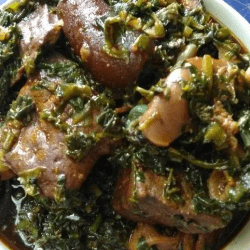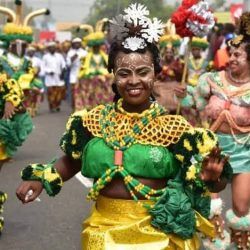How to prepare Edikang Ikong meal
Edikaikong is a vegetable soup of the Ibibios or Efiks people found largely in Akwa Ibom state, South-South region of Nigeria.
Edikang Ikong is delicious, nutritious and has a lot of essential vitamins only when eating fresh.


Here is a recipe on how to make the authentic EdikanKong soup.
- Time: 90 mins
- Servings: 6-8
Ingredients
- 1 kg (5 bunch of Pumpkin leaves), ugwu
- 500 g water leaves
- 2 handful ntong (scent leaves or Effirin}
- 1 kg Assorted meat
- Ponmo
- 200 ml (2 cups) Palm oil
- 1 Medium onions
- 1 Cup of periwinkles
- 1 Large stockfish head
- 2 Medium sized smoked Fish
- 6 fresh Yellow pepper (pounded)
- 1 Cup pounded crayfish
- 1/2 Cup dried shrimps (slightly pounded)
- 1 tbs black pepper
- 2 stock cubes
- Salt
Cooking Instructions
Step ①
Before cooking, wash properly and allow to drain then slice the vegetables. ugwu, water leaves and scent leaves. Put each in separate bowls.
Step ②
Wash the meat, seasons accordingly and cook till almost soft, then add the washed stockfish head. Make sure the meat is almost dried. You don’t need water in the soup because the water leaves and palm will generate it for the soup.
Step ③
Before the stock driea out completely, add water leaves, pour in the palm oil, add periwinkles, pounded fresh pepper and stir properly. cook for 3-5 minutes. Ensure that you don’t over cook the water leaves.
Step ④
Add ugwu, scent leaves, pounded shrimps, smoked fish, black pepper, seasoning cubes and stir the content of the pot very well. Cover the pot and leave to cook for 5 minutes.
Step ⑤
Add the pounded crayfish. Taste the meal for salt adequacy, give it a stir and that’s it. Be mindful of the salt and seasoning cubes, because the soup can easily become salty.
Step ⑥
Remove from fire and enjoy with fufu, pounded yam, somvita or eba.
Akwa Ibom
Akwa Ibom is a state in the South-South geopolitical zone of Nigeria, bordered by Cross River, Rivers, Abia, Ebonyi states and the Atlantic Ocean.


It was created in 1987 from Cross River State and has 31 local government areas.
It has a population of about 5.5 million people as of 2016 and is the 15th most populous state in Nigeria.
The state is rich in natural resources such as oil, gas, clay, limestone, salt, and coal.
Akwa Ibom is also known for its cultural diversity and language similarities. There are over 20 languages spoken in Akwa Ibom, but the major ones are Ibibio, Anaang, Efik, and Igbo.
Akwa Ibom takes its name from the Qua Iboe River which bisects Akwa Ibom before flowing into the Bight of Bonny.
Akwa Ibom has a tropical climate with two seasons: rainy and dry. The rainy season lasts from April to October and the dry season from November to March.
It is home to various tourist attractions such as the Ibom Plaza, the Ibeno Beach, the Stubb’s Creek Forest Reserve, the National Museum of Colonial History, and the Meridien Akwa Ibom golf course.
Akwa Ibom has a vibrant culture and celebrates various festivals such as the New Yam Festival, the Ekpe Masquerade Festival, the Leboku Festival, and the Christmas Carols Festival.
Located in the South Eastern part of the country, Akwa Ibom is a key member of Nigeria’s South South Zone, rich in crude oil, natural gas and a diversity of agricultural produce.



Over 5000 expatriates working for various organisations like Exxon Mobil, Shell, Chevron, Elf, the Aluminum Smelter Company, ALSCON, Forrestal, Reynold International and the University of Uyo have found a home here.


Capital City: Uyo
Other Major Cities: Eket, Ikot Ekpene, Abak, Ikot Abasi and Oron.
Ethnic Groups: Multi-ethnic: Ibibio, Anang, Oron, Eket, Ibeno, Mbo
Location: Latitude 4o 32’ and 5o53’ North and Longitude 7o25’ and 8o25 East.
Area: 8,412 square kilometers


Climate: Tropical climate marked by two distinct seasons; the dry season (November – March) and the wet season (April – October). The wet season is usually interrupted by a short dry spell in August.
Mean annual rainfall is 2,200mm in the north of the state and 3,500mm in the south of the state.
Sunshine is between 1,400 to 1,500 hours per year. Average temperature range from 23oC to 31oC.
Vegetation: Three easily distinguishable vegetation; the saline water swamp forest, the fresh water swamp forest and the rainforest.
Mineral Resources: Crude oil, natural gas, limestone, gold, salt, coal, silver nitrate, glass sand, kaolin.
The major industrial crop is the oil palm tree. The Akwa Ibom has the densest groves of oil palm in Nigeria. The Akwa Palm Industries PLC was set up in 1991 to harness the full potential of this crop.

The production of crude palm oil will allow for downstream industries which can refine the oil into vegetable oil, soaps, margarine, glycerin, candles, detergents and numerous other products. The kernel oil is used for the manufacture of high quality toilet soap. Bye product from the oil palm industries are used for the production of livestock feeds.
Arable Crops
Cassava
Yam
Cocoyam
Maize
Rice
Cowpea
Melon
Horticultural or Fruit Crops
Plantain
Banana
Pineapple
Pawpaw
Mango
African peas
Vegetable Crops
Leafy vegetable
Okro
Pepper
Tomatoes
Cash Crops
Oil palm
Coconut
Rubber
Cocoa
Raffia palm
Gmelina
Kola
Although Akwa Ibom is mineral-rich, agriculture is the bedrock of its economy. It employs about 70 percent of the state’s workforce. Most are engaged in subsistent farming. The industrial sector is small and is dominated by government owned companies. The private sector is active in the service areas, although a few industries are privately owned.
At inception, the state inherited a number of companies from Cross River State. These are:
- Sunshine Batteries, Essien Udim
- Peacock Paint, Etinam
- Quality Ceramic Industries, Itu
- Qua Steal Products Limited, Eket
- Asbestonit Industries, Oron
- Plasto – Crown Industries, Uyo
- International Biscuits Limited, Ikot Ekpene
- Champion Breweries, Uyo
- Pamil Industries, Abak

Most of the companies are ailing, becoming a drain on government. As part of the economic policies, these companies are to be revived and privatized. Government is diverting its interest in them in line with overall philosophy to focus on creating an enabling environment for private sector initiatives to flourish.
LGAs in Akwa Ibom State
The LGAs (Local Government Areas) in Akwa Ibom State are:
- Abak
- Eastern Obolo
- Eket
- Esit Eket
- Essien Udim
- Etim Ekpo
- Etinan
- Ibeno
- Ibesikpo Asutan
- Ibiono Ibom
- Ika
- Ikono
- Ikot Abasi
- Ikot Ekpene
- Ini
- Itu
- Mbo
- Mkpat Enin
- Nsit Atai
- Nsit Ibom
- Nsit Ubium
- Obot Akara
- Okobo
- Onna
- Oron
- Oruk Anam
- Udung Uko
- Ukanafun
- Uruan
- Urue-Offong/Oruko
- Uyo


